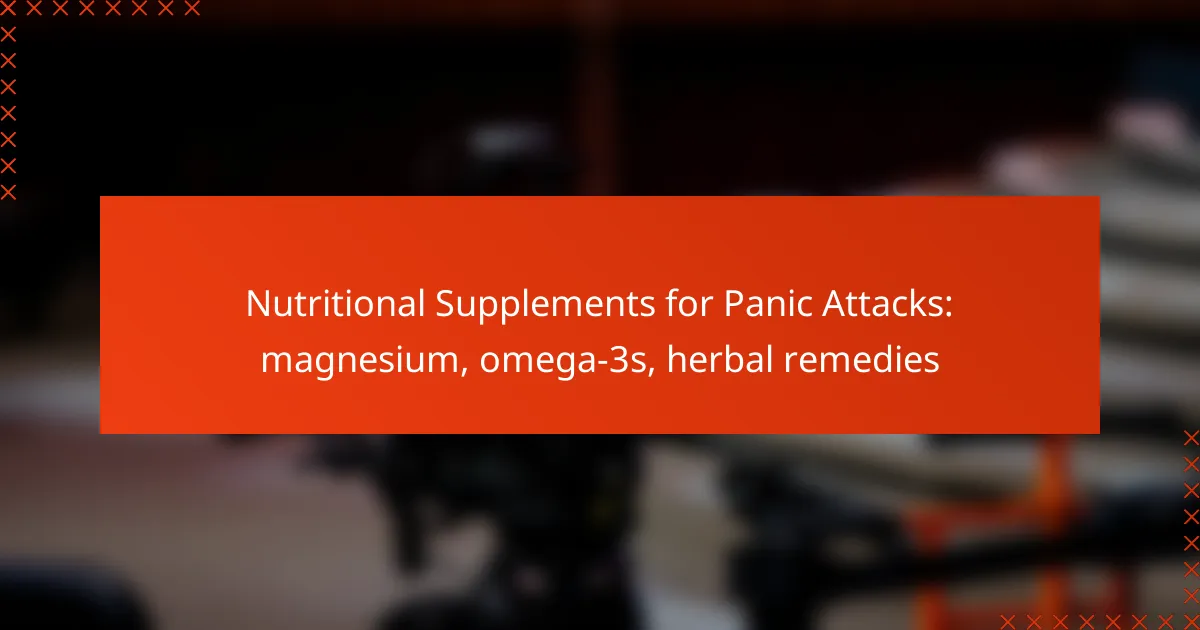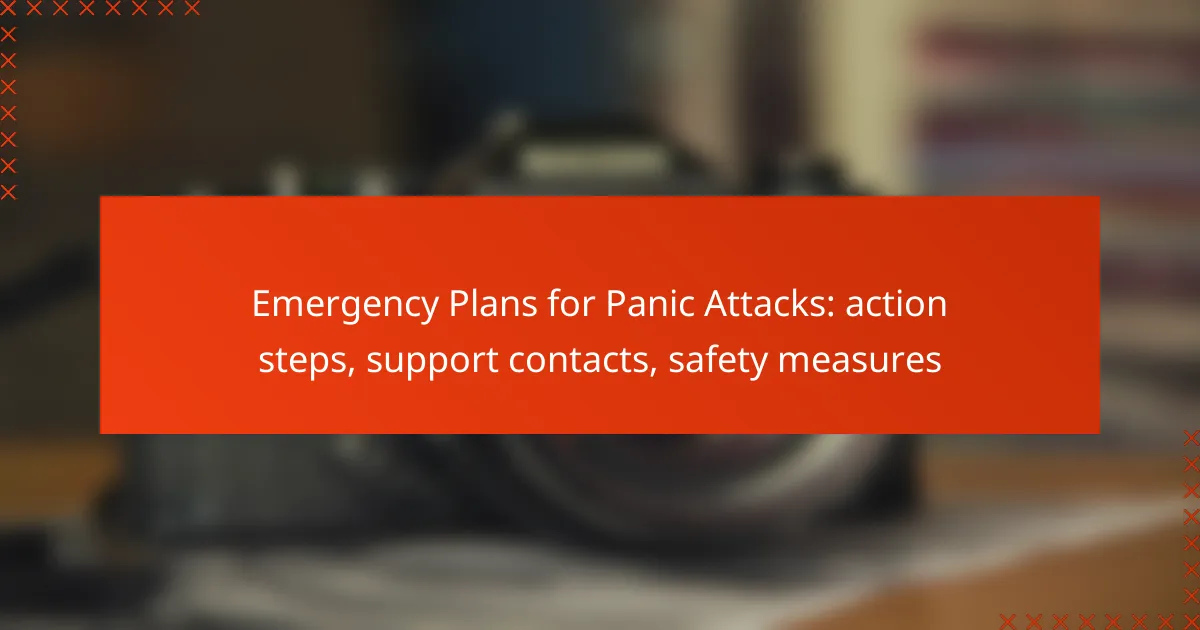Nutritional supplements such as magnesium, omega-3 fatty acids, and various herbal remedies may offer relief for individuals experiencing panic attacks. These supplements can positively influence neurotransmitter function, helping to alleviate anxiety symptoms and support overall mental health. Incorporating these nutrients into a wellness regimen may enhance emotional regulation and improve mood stability.
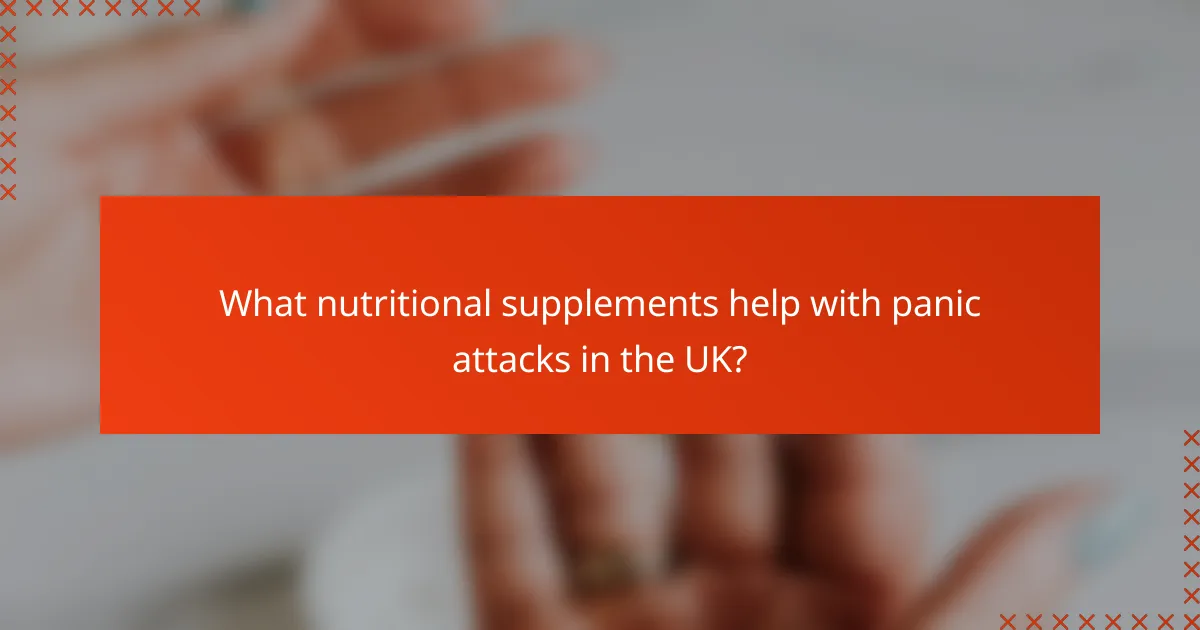
What nutritional supplements help with panic attacks in the UK?
Nutritional supplements that may help with panic attacks in the UK include magnesium, omega-3 fatty acids, and various herbal remedies. These supplements can support mental health by influencing neurotransmitter function and reducing anxiety symptoms.
Magnesium supplements
Magnesium is known for its calming effects on the nervous system, which can be beneficial for those experiencing panic attacks. It plays a role in regulating neurotransmitters that send signals throughout the brain and body.
Consider taking magnesium glycinate or citrate, as they are well-absorbed forms. Typical dosages range from 200 to 400 mg per day, but it’s advisable to consult a healthcare professional for personalized recommendations.
Omega-3 fatty acids
Omega-3 fatty acids, found in fish oil and certain plant oils, have been linked to improved mood and reduced anxiety. They may help stabilize emotional responses and lower the frequency of panic attacks.
For effective results, aim for a daily intake of around 1,000 to 2,000 mg of combined EPA and DHA, the two key types of omega-3s. Look for high-quality supplements that are tested for purity and potency.
Herbal remedies
Several herbal remedies, such as valerian root, passionflower, and chamomile, are often used to alleviate anxiety and promote relaxation. These can be effective alternatives or complements to traditional treatments.
When using herbal supplements, it’s essential to follow dosage instructions on the product label and consult with a healthcare provider, especially if you are taking other medications. Be cautious of potential interactions and side effects.

How does magnesium alleviate panic attacks?
Magnesium can help alleviate panic attacks by regulating neurotransmitters and reducing anxiety symptoms. This mineral plays a crucial role in brain function and emotional regulation, making it a valuable supplement for those experiencing panic attacks.
Reduces anxiety symptoms
Magnesium has been shown to lower anxiety levels by influencing the hypothalamic-pituitary-adrenal (HPA) axis, which controls stress responses. Adequate magnesium intake may lead to a calmer state of mind, reducing the frequency and intensity of panic attacks.
Foods rich in magnesium, such as leafy greens, nuts, and whole grains, can be beneficial. For supplementation, doses typically range from 200 to 400 mg per day, but it’s advisable to consult a healthcare professional for personalized recommendations.
Supports neurotransmitter function
Magnesium is essential for the synthesis of neurotransmitters like serotonin and dopamine, which are critical for mood regulation. By supporting these neurotransmitters, magnesium can help stabilize emotions and reduce the likelihood of panic attacks.
To enhance neurotransmitter function, consider incorporating magnesium-rich foods into your diet or taking a supplement. Be cautious with high doses, as excessive magnesium can lead to side effects such as diarrhea or abdominal discomfort. Always consult with a healthcare provider before starting any new supplement regimen.
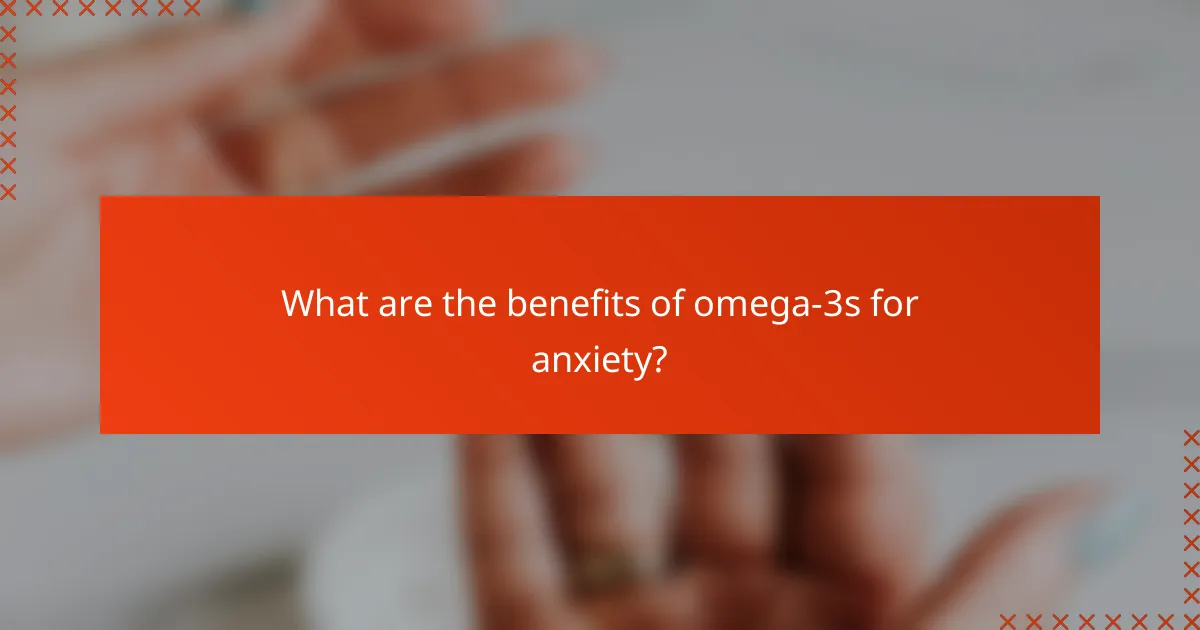
What are the benefits of omega-3s for anxiety?
Omega-3 fatty acids are known to provide several benefits for anxiety, including improved mood regulation and reduced symptoms of stress. These essential fats can influence brain function and emotional health, making them a valuable addition to a wellness regimen for those experiencing anxiety.
Improves mood stability
Omega-3s play a crucial role in maintaining mood stability by supporting neurotransmitter function and reducing mood swings. Regular intake of omega-3s may help balance serotonin and dopamine levels, which are vital for emotional well-being. Foods rich in omega-3s, such as fatty fish, flaxseeds, and walnuts, can be easily incorporated into daily meals.
For those considering supplements, a daily dosage of around 1,000 to 2,000 mg of combined EPA and DHA is often recommended. However, it’s wise to consult a healthcare provider to determine the right amount based on individual needs and health conditions.
Reduces inflammation
Chronic inflammation has been linked to various mental health issues, including anxiety. Omega-3 fatty acids possess anti-inflammatory properties that can help mitigate this inflammation, potentially leading to reduced anxiety symptoms. By lowering inflammation, omega-3s may improve overall brain health and function.
Incorporating omega-3-rich foods into your diet can be an effective strategy. Aim for at least two servings of fatty fish per week or consider high-quality fish oil supplements if dietary sources are insufficient. Always check for third-party testing to ensure the purity and potency of supplements.
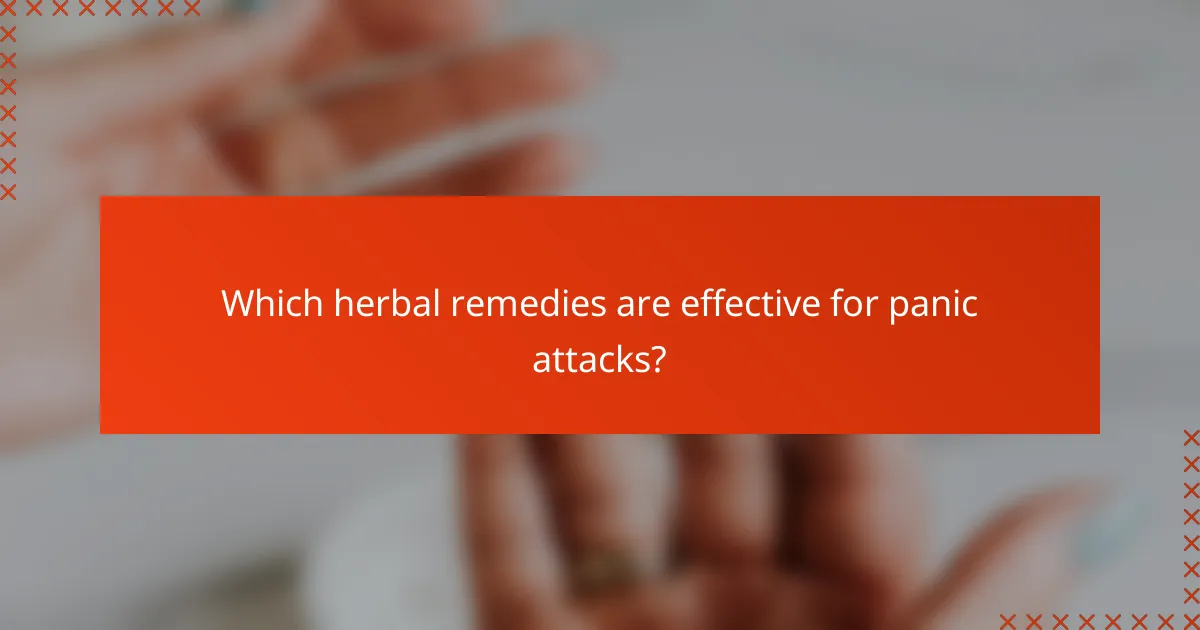
Which herbal remedies are effective for panic attacks?
Several herbal remedies are known to help alleviate symptoms of panic attacks, with chamomile and lavender being among the most effective. These natural options can provide calming effects and may be used alongside other treatments for anxiety.
Chamomile
Chamomile is widely recognized for its calming properties, often consumed as a tea or in supplement form. It contains antioxidants that may help reduce anxiety and promote relaxation, making it a popular choice for those experiencing panic attacks.
When considering chamomile, aim for a daily intake of 400-1600 mg of chamomile extract, or enjoy 1-2 cups of chamomile tea. Be cautious if you have allergies to plants in the daisy family, as this may lead to adverse reactions.
Lavender
Lavender is another effective herbal remedy for panic attacks, known for its soothing aroma and potential to reduce anxiety levels. It can be used in various forms, including essential oils, teas, and capsules.
For anxiety relief, consider using lavender essential oil in aromatherapy or taking 80-160 mg of lavender oil capsules daily. Always consult with a healthcare professional before starting any new supplement, especially if you are pregnant or taking medications.
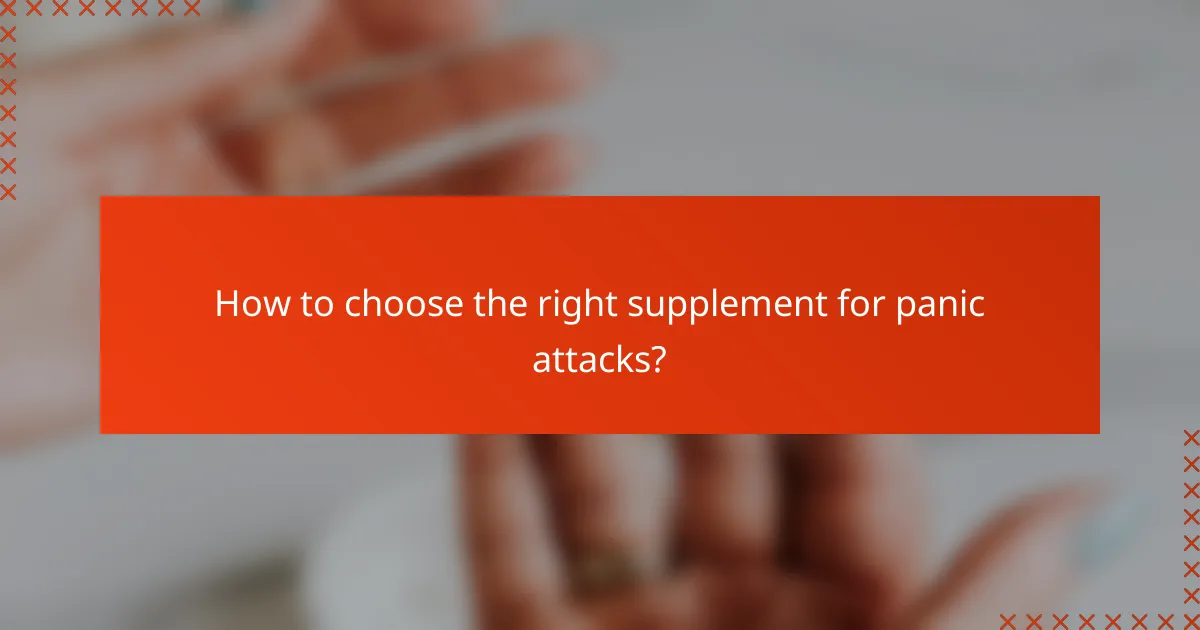
How to choose the right supplement for panic attacks?
Selecting the right supplement for panic attacks involves understanding your specific needs and consulting with a healthcare professional. Key supplements like magnesium, omega-3 fatty acids, and various herbal remedies can support mental health, but individual responses may vary.
Consult a healthcare professional
Before starting any supplement for panic attacks, it’s crucial to consult a healthcare professional. They can evaluate your symptoms, medical history, and current medications to recommend appropriate options. This step helps avoid potential interactions and ensures that the chosen supplements align with your overall treatment plan.
Healthcare providers can also guide you on dosages and timing, which can significantly impact the effectiveness of the supplements. For example, magnesium may be more effective when taken in the evening, while omega-3s might be beneficial when consumed with meals.
Consider personal health conditions
Your personal health conditions play a significant role in choosing the right supplement for panic attacks. If you have existing health issues, such as kidney problems or allergies, certain supplements may not be suitable. For instance, individuals with kidney disease should be cautious with magnesium supplementation.
Additionally, consider any mental health conditions you may have. Some herbal remedies, like valerian root or passionflower, may interact with medications for anxiety or depression. Always review your health status with a professional to ensure safety and effectiveness.

What are the potential side effects of these supplements?
Potential side effects of nutritional supplements for panic attacks can vary based on the type of supplement. While many people tolerate these supplements well, some may experience adverse effects that can impact their health and well-being.
Magnesium side effects
Magnesium supplements are generally safe, but they can cause gastrointestinal issues such as diarrhea, nausea, or stomach cramps in some individuals. These side effects are often dose-dependent, meaning higher doses are more likely to lead to discomfort.
It’s advisable to start with lower doses and gradually increase to assess tolerance. For adults, a daily intake of 310-420 mg is common, but exceeding this can increase the risk of side effects.
Omega-3 side effects
Omega-3 fatty acids, commonly found in fish oil supplements, can lead to side effects like fishy aftertaste, bad breath, or gastrointestinal upset. In some cases, they may also increase the risk of bleeding, particularly if taken in high doses or alongside blood-thinning medications.
For most adults, a daily intake of 250-500 mg of combined EPA and DHA is recommended for general health, but it’s important to consult with a healthcare provider before starting high-dose supplementation.
Herbal remedy interactions
Herbal remedies can interact with other medications, leading to increased side effects or reduced effectiveness. For example, St. John’s Wort may interfere with antidepressants, while valerian root can enhance the effects of sedatives.
Always consult a healthcare professional before combining herbal remedies with prescription medications. Keeping a list of all supplements and medications can help avoid potential interactions and ensure safe use.
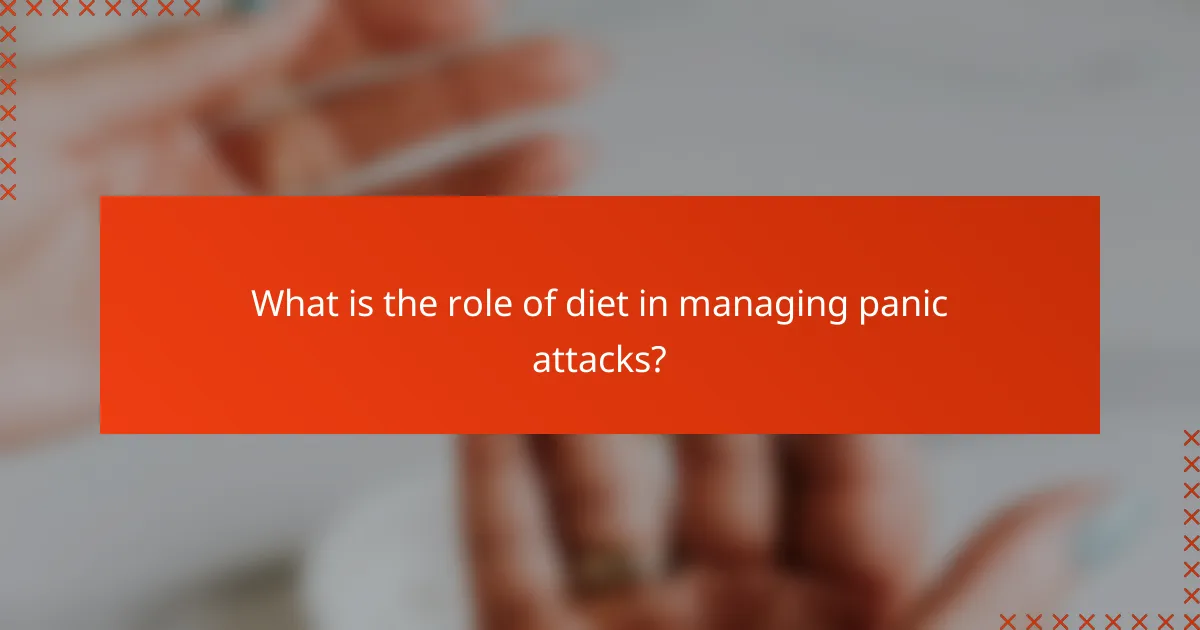
What is the role of diet in managing panic attacks?
Diet plays a significant role in managing panic attacks by influencing brain chemistry and overall mental health. Nutritional choices, including specific supplements, can help reduce anxiety symptoms and improve emotional resilience.
Magnesium
Magnesium is essential for numerous bodily functions, including nerve transmission and muscle relaxation, which can help alleviate anxiety symptoms. Low magnesium levels have been linked to increased anxiety and panic attacks, making supplementation a potential option for those struggling with these issues.
To incorporate magnesium into your diet, consider foods rich in this mineral, such as leafy greens, nuts, seeds, and whole grains. Supplements are also available, with recommended daily intakes typically ranging from 310 to 420 mg, depending on age and gender.
Omega-3s
Omega-3 fatty acids, found in fish oil and certain plant sources, have been shown to support brain health and reduce anxiety levels. These essential fats play a role in regulating neurotransmitters, which can help stabilize mood and reduce the frequency of panic attacks.
To boost your omega-3 intake, consider consuming fatty fish like salmon or mackerel at least twice a week, or include plant-based sources such as flaxseeds and walnuts in your diet. If opting for supplements, look for those containing EPA and DHA, with a daily dosage often recommended between 1,000 to 2,000 mg.
Herbal Remedies
Herbal remedies such as valerian root, passionflower, and chamomile have been traditionally used to manage anxiety and promote relaxation. These herbs may help reduce the severity and frequency of panic attacks by calming the nervous system.
When considering herbal supplements, it’s important to consult with a healthcare professional to ensure safety and appropriate dosages. Common dosages vary widely, so following product guidelines and being aware of potential interactions with other medications is crucial.
